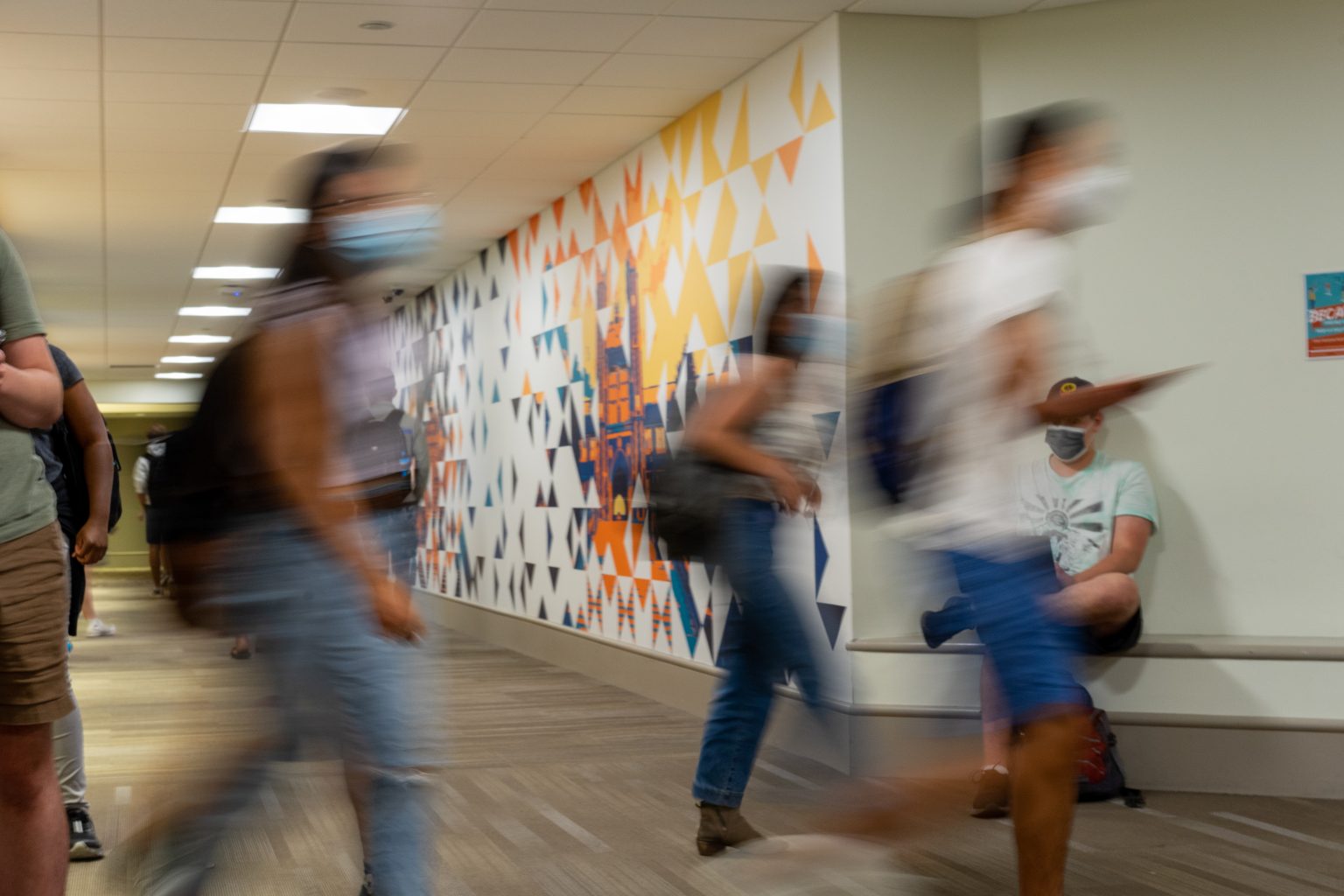Academics | News
Students and faculty adjust to an online learning environment as the semester kicks off virtually

Students move through the hallways of Simon Hall in between classes. (Photo by Holden Hindes / Student Life)
Washington University concluded the semester’s first two weeks of online classes Friday, marking the first time most courses have been fully remote since Spring 2021. For many students, the return to remote learning signified a rocky start to the semester.
“It didn’t really feel real,” sophomore Natalie Valles said after the first week. “I already have a really hard time with focusing, but even more so online. It’s really easy to just zone out, want to do something else.”
Students often view the first two weeks as an opportunity to set a positive tone for the rest of the semester. With classes online, this became more difficult.
“When it’s online, it doesn’t feel like the deadlines are as hard,” Valles said. “It’s just really nerve-wracking trying to figure out how I’m going to balance everything in-person because I don’t really know what it’s like to do those classes in-person.”
Freshman Michael Zaslavskiy said he had “a very mixed experience” with his first online classes at the University. “Some professors are very organized in the way that they present information and our tasks virtually,” said Zaslavskiy. “But then, for example, I’m taking Comp. Sci. 132, and I just think the organization of the class was very poor. It’s been very difficult to actually understand what I’m doing because there is so little instruction.”
The decision to conduct the first two weeks of the semester remotely was announced in an email from University leadership on Dec. 30 in response to a nationwide rise in cases of the omicron variant. Students were not permitted to return to campus until Friday, Jan. 28 without exceptions from Residential Life.
Sophomore Jocelyn Epstein was hopeful that her classes would be “more relaxed” for the first two weeks of the semester due to the fact that most students would be taking their classes from home. However, she said, she was met with little accommodation from her teachers.
“I got kind of thrown under the bus with all my classes,” said Epstein, who is primarily taking courses in the McKelvey School of Engineering. “No one was letting homework take a backseat for now, and they did not seem worried at all that we were in an environment that might not be conducive to learning.”
Some students and professors have also faced logistical issues resulting from the shift to remote learning. Valles, who supports themself financially, was supposed to start a new job on Jan. 17, and the prospect of losing that income caused “a lot of stress and a lot of panic” as they scrambled to request early-housing accommodations.
Dr. Emily Cohen-Shikora, a lecturer in the Department of Psychological and Brain Sciences, struggled to balance restructuring her class into an effective online format and securing childcare for her two small children amid COVID-19-related daycare closures. Nevertheless, she was surprised by how willing her students were to participate, even over Zoom.
“I am just shocked at how many students had their cameras on that were super engaged. I have almost 100% attendance in all of my classes. I have almost 100% participation,” said Cohen-Shikora. “I’ve just been really, really impressed by students who, no doubt, are not excited to sit there and be on Zoom for hours and hours, but are just really good with the engagement.”
Dr. Elizabeth Reynolds, a postdoctoral research fellow in the History Department, was similarly happy with her students’ performance despite the circumstances.
“In my freshman seminar this semester, I don’t think there was a single difference between being in class and on Zoom,” said Reynolds. “Everybody was raising their hand, everybody was talking.” However, she said that this is often simply an element of first-year seminars, and that in higher-level courses, such as the History of China course she is teaching this semester, she does “find it more difficult to get people to participate in an online format.”
The impersonal nature of Zoom has certainly made it harder for some instructors, such as Dr. Robert Henke, a professor in the Performing Arts Department, to connect with students like he would in person.
“I’m a bit of a performer, you know, and I like to see how the room is responding,” Henke said. “It’s really hard on the Zoom screen to sort of see how people are taking things in.”
At the same time, Henke said he has embraced the positive aspects of online learning, which has forced him to better organize his Canvas page and allowed him to conduct interactive online surveys, a feature which he may incorporate into future lessons in-person. Like Reynolds and Cohen-Shikora, Henke said participation has been good.
While Reynolds did acknowledge that online teaching was “not as good as in-person,” she said that she has largely accepted it as part of life with COVID-19.
“I do think, to some extent, we as a society in the United States are learning how to adapt to life with COVID,” Reynolds said. “This is going to be part of that process of learning how to adapt.”
In a follow-up email sent out Jan. 26, University leaders reiterated the importance of masking and avoiding food, drink and crowding at indoor events and “strongly recommended” masks that meet ASTM Level 1 or higher. There are currently no plans to return to fully-online instruction.
